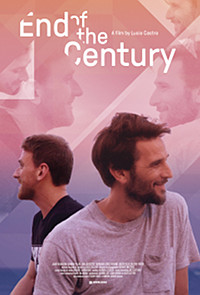| SHADOWS ON THE WALL | REVIEWS | NEWS | FESTIVAL | AWARDS | Q&A | ABOUT | TALKBACK | |||||||||||||||||||||||||||||
 Shadows off the beaten path Shadows off the beaten pathIndies, foreigns, docs, revivals and shorts...
On this page:
END OF THE CENTURY |
NEVRLAND |
THE SHINY SHRIMPS
| |||||||||||||||||||||||||||||
| See also: SHADOWS FILM FESTIVAL | Last update 27.Jul.19 | |||||||||||||||||||||||||||||
|
End of the Century Fin de Siglo Review by Rich Cline | 
 
|  Observationally shot and beautifully edited, this delicate drama by Argentine filmmaker Lucio Castro pulls the audience in slowly with its striking imagery and relaxed characters. The film's structure is ambitious, with time periods that overlap and echo in unexpected ways, and the enigmatic style of filmmaking makes it surprisingly involving as it plays with the idea of memory, the passage of time and alternate realities. On holiday in a rented flat in central Barcelona, the 40-ish Ocho (Barberini) quietly explores the city. From his balcony he spots the younger Javi (Pujol), who returns an intrigued glance when their paths cross again on a beach. When they finally meet, they realise they're both just visiting, the Argentine Ocho from New York and the Spanish Javi from Berlin. After some friendly sex, they meet up again for dinner and Ocho has a feeling they've met before. Indeed, many years earlier, Javi was in a relationship with Ocho's old friend Sonia (Maestro). Ocho is an artist, which allows Castro to weave evocative elements into the story that play with perception and connection. Conversations about relationships past and present draw out a range of reactions. After a 20-year relationship, Ocho is just enjoying being alone, while Javi has lived with his husband in Berlin for four years, and they have a baby daughter. The way the story jumps is a little disorienting, suddenly shifting to the first time Ocho and Javi spent a day together, then further scrambling the timeline. Both Barberini and Pujol have an earthy, naturalistic manner that's compelling, building curiosity about both characters while creating strong chemistry between them. While the second act takes place 20 years before the first, they aren't depicted as being any younger, which adds an eerie timelessness to their interaction. These are the same two men who once met back before the turn of the millennium and find that they still have the same magnetic mutual attraction. And the third act is even more intriguing. Castro lets themes swirl around, from the nature of art to the idea of parenthood to concerns about HIV infection. There's also a discussion of a three-part painting that challenges with the magical rather than rational. These and other elements offer continual surprises, sparking thought and touching on ideas that subvert the usual logical approach of a movie narrative. So where this goes in the end is of course anything but straightforward, slipping into a sequence that brings together feelings, memories and possibilities. It's remarkably hopeful and deeply moving.
|
| Nevrland Review by Rich Cline | 
| 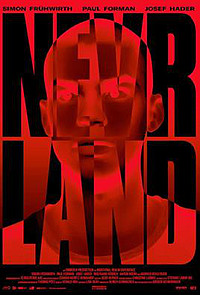 dir-scr Gregor Schmidinger prd Ulrich Gehmacher with Simon Fruhwirth, Paul Forman, Josef Hader, Wolfgang Hubsch, Anton Noori, Markus Schleinzer, Nico Greinecker, Max Meyr, Peter Machacek, Carl Achleitner, Milena Nikolic release UK Mar.19 flare, US Jul.19 off 19/Austria 1h28  
| 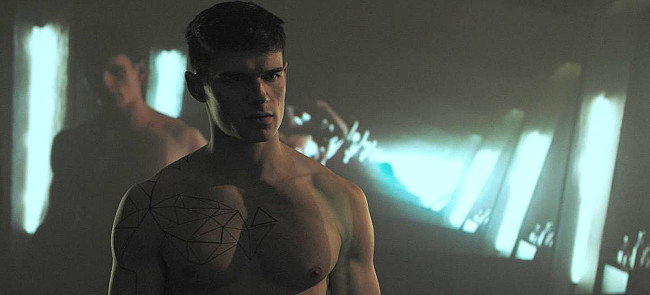 First-time Austrian filmmaker Gregor Schmidinger demonstrates his love of film history with a psychological thriller that stylistically echoes masters from Cocteau to Kubrick to Noe. Digging deeply into the mental state of the protagonist, this bold and involving film can't help but unnerve the audience as it drags us down a psychedelic rabbit hole that involves suppressed sexuality, a nervous disposition and serious daddy issues. At 17, Jakob (Fruhwirth) is the primary career for his housebound grandfather (Hubsch) and also takes a job working with his dad (Hader) as a butcher at the industrial slaughterhouse in town. In his spare time he secretly watches gay porn on his laptop, and one day connects with 26-year-old Kristjan (Forman) on a webcam site. Since Jakob has never even kissed a guy, this brings up some unexpressed feelings that cause significant anxiety. And when it begins to affect his work, his doctor prescribes meds. Then Kristjan offers him something significantly stronger. From the start, Schmidinger pushes the audience into Jakob's mind, with his repeated fantasies of running through a dense forest. These of course get increasingly colourful and darkly intense as his odyssey with Kristjan progresses, tipping the film into luridly cinematic visions that are skilfully shot and edited for maximum impact. It's a remarkably bold directing debut that plays with a range of classical imagery, using pulsing light, sound and colour. And the emotions are strikingly resonant. In a difficult role, Fruhwirth also delivers a potent debut, conveying Jakob's swirling thoughts without overplaying anything. In his eyes, the subtle fears, yearnings and frustrations are astonishingly visceral. And they're also easy to identify and sympathise with. Those opposite him are less detailed, of course, because everything is seen through his eyes. But each actor has a strong presence, most notably the enigmatic Forman, who remains intriguingly aloof, drawing in both Jakob and the audience. This is not a film with a linear narrative; it's a swirling journey through the past and present, as this young man dives into his imagination and explores his fears. The imagery is deliberately provocative, from the blood dripping from pig carcasses at Jakob's work to the pounding music and invasive strobe lighting of an underground nightclub with its graffiti-covered toilets and cavernous darkroom. Even at home, Jakob's mind can't help but turn on itself. But Schmidinger channels this material with intent: this young man isn't wallowing in his mental turmoil, he's working a way through it. Which makes the film exhilarating.
|
| The Shiny Shrimps Les Crevettes Pailletées Review by Rich Cline | 
| 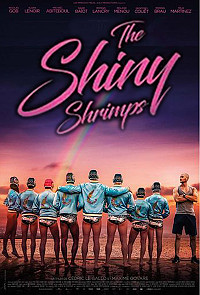 dir-scr Cedric Le Gallo, Maxime Govare prd Renaud Chelelekian, Edouard Duprey with Nicolas Gob, Alban Lenoir, Michael Abiteboul, David Baiot, Romain Lancry, Roland Menou, Geoffrey Couet, Romain Brau, Felix Martinez, Maia Quesemand, Pierre Samuel, Camille Thomas-Colombier release Fr 8.May.19, US Jul.19 off, UK 6.Sep.19 19/France 1h40 
| 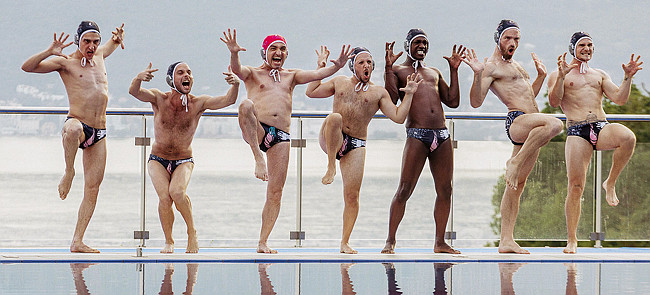 Based on a true story, this French comedy has a driving pace and a cast of colourful characters who are a lot of fun to spend 100 minutes with. Filmmakers Maxime Govare and Cedric Le Gallo gleefully play with racy innuendo and cheeky visual gags, but they also have serious themes on their mind, which are mostly woven neatly into the narrative. Although the final act feels abrupt. Clinging to his Olympic career at age 33, Matthias (Gob) gets himself in trouble by using a homophobic slur on television. So the court orders him to coach the Shiny Shrimps as they prepare to compete at the Gay Games in Croatia. With little choice, he meets team leader Jean (Lenoir) and his motley crew of lively swimmers. And while Matthias doesn't take it too seriously, his teen daughter Victoire (Quesemand) becomes the Shrimps' biggest fan. She also likes how this brings out a side of her dad she's never seen. Each team member has a salient issue to stir into the narrative: Jean is hiding his cancer relapse, while his ex Alex (Baiot) is still heartbroken. Cedric (Abiteboul) tells his husband (Samuel) he's quitting the team to spend time with their twin babies, but he hasn't. Damien (Lancry) rents an open-top bus for a Priscilla-style drive across Europe. Joel (Menou) feels too old to find love. Xavier (Couet) finds too much love everywhere. Fred (Brau) has transitioned into a woman. And young Vincent (Martinez) has only just come out. The actors ground the roles by underplaying them, then throwing personality quirks that lead to hilarious sideroads and interconnections. At the centre, there's never a doubt about Matthias' journey from presumptive sports-star to thoughtful maturity, although it takes quite a while for him to even begin heading in that direction. Thankfully, Gob makes him engaging even when he's being a jerk. Lenoir has the other focal role as a man who decides to live fully rather than go out with a whimper. The Shrimps are funny on their own, and their bouncy camaraderie is often hysterical, even as it astutely observes how gay men create families with each other. So it's frustrating that the script feels somewhat unfinished. Aside from Matthias, the characters never develop much depth. They're thoroughly entertaining, but we'd like to get to know them. So the sudden gear-shift before the final scenes leaves the audience watching a completely different film. At least it's still fabulous.
| 
See also: SHADOWS FILM FESTIVAL © 2019 by Rich Cline, Shadows
on the Wall
HOME | REVIEWS | NEWS | FESTIVAL | AWARDS
| Q&A | ABOUT | TALKBACK | | ||||||||||||||||||
